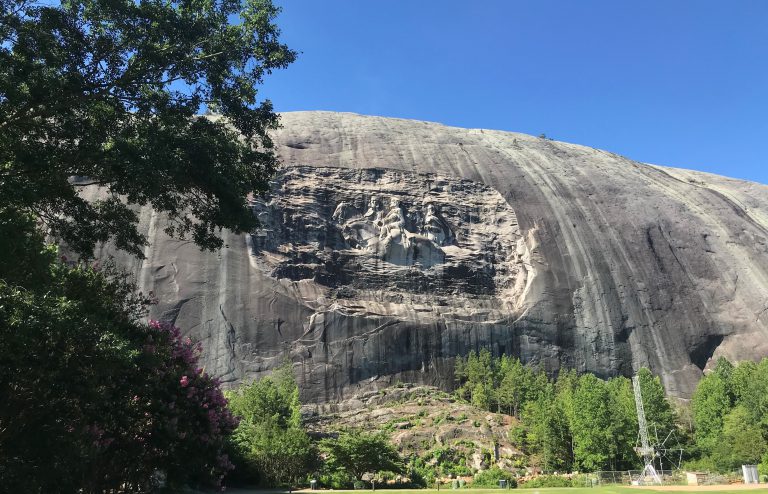ATLANTA – A walk along the trails at Stone Mountain Park near Atlanta, Georgia can be peaceful. The sweeping views from the top of the mountain can be breathtaking, and a visit to a new dinosaur exhibit there can be educational.
But looming over all of this natural beauty is a nearly 100 foot tall carving of Confederate Generals Stonewall Jackson and Robert E. Lee and Confederate President Jefferson Davis, all on horseback with their hats pressed against their hearts.
The carving at Stone Mountain is one of the park’s defining features, but it has also become the focus for protests and calls to revisit the region’s racist past as communities across the country grapple with questions about who we should memorialize, whose history we should honor.
Differing Views
Through the years, millions of people have stood and looked up at the carving on the side of Stone Mountain. Among them, a high school student from Jackson, Mississippi, named Beverly Clark, who visited with her choir group in the 70s.
“It was really exciting because it was the first time I had ever seen the carving, it was just magnificent,” said Clark.
Clark still lives in Jackson. She taught elementary school – including Civil War history – for years.
Earlier this summer, news reports from Georgia caught her eye, when on July 4th, armed African-American protestors marched on Stone Mountain demanding the carving’s removal.
That prompted Clark to write a letter to leaders in DeKalb County, where the state park is located.
“The fact that it’s just a gorgeous piece of art, I don’t see how anybody could want anything to happen to it, that’s one of those things that needs to be preserved for all time,” said Clark.
Preserved, even if it honors men who took up arms against the United States in defense of slavery.
Ed Williams, a professor and community activist who lives in the Atlanta area, argues that the carving isn’t as much about the Civil War as it is about more recent history. This tribute to the confederacy wasn’t actually completed until the early 1970s. That’s 50 years after work on it began and a full century after the Confederacy fell.
“I believe that the carving depicts a moment of time in our history where American embraced racism,” Williams said. During that period – between the end of the Civil War and the 1970s – Williams says there were, “big, huge issues with racism here in Georgia and throughout the South.”
Williams became involved in efforts to either remove or modify the carving five years ago, when protests erupted in Ferguson, Missouri, over the death of Michael Brown at the hands of police.
He says the most recent wave of protests makes a change at Stone Mountain even more pressing.
“Well, I would say certainly this time, I believe there is a momentum that’s the greatest we’ve probably seen in 50 years,” said Williams. “The death of George Floyd caused a realization to many Americans that racism still exists and it’s so obvious that from his killing that that’s something that we can no longer tolerate in the American psyche and in our public squares.”

‘It’s Not Something You Can Ignore’
Williams is gathering signatures on a petition and continues to press state lawmakers to make a change. And he has the attention of at least one lawmaker at the Georgia Capitol, Democratic State Rep. Shelly Hutchinson.
“I would be okay if they just sandblasted it off,” said Hutchinson. “I mean, Stone Mountain, in and of itself is [a] place to visit and it’s a nice park and I’d love to bring my kids there, and I do not go there because of it. And it’s not something that you can ignore. You drive past and you can see it from your car.”
In the final days of this year’s legislative session Hutchinson introduced a bill banning confederate symbols on state property.
But that would conflict with a current law, passed in 2019 by Georgia’s Republican-controlled general assembly, that prohibits the removal of monuments. The Stone Mountain Memorial Association says its hands are tied by that law.
Still, in recent years, the association says they’ve done what they could to downplay the celebration of the confederacy in the park, to “adjust to the changing feelings of the public on this issue.”
Emil Moffatt produced this story as part of the America Amplified initiative using community engagement to inform and strengthen local, regional and national journalism. America Amplified is a public media initiative funded by the Corporation for Public Broadcasting.
Q: What did the people you talked to say about the experience of being interviewed for public radio?
The people interviewed for this story have strong views on this issue, as is demonstrated by their prior public advocacy about the Stone Mountain carving. They were very much open to the opportunity to tell their side in a forum that gave them the opportunity to discuss the nuances of their views in an in-depth discussion.
Q: What surprised you about this type of community engagement?
That, while some people are hesitant to speak on controversial issues, others are comfortable doing so, if you allow them the time and space to express their views as completely as possible.
Q: What lessons do you have for others who want to do the same?
Give people who you want to interview a little time to consider talking with you – they may just need a little time and a little more information about what your story is about what specifically you want to talk with them about.

